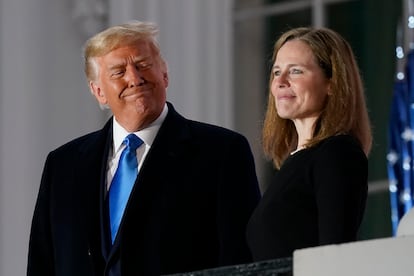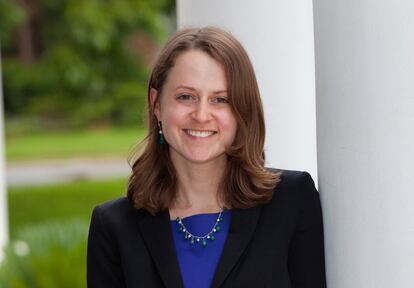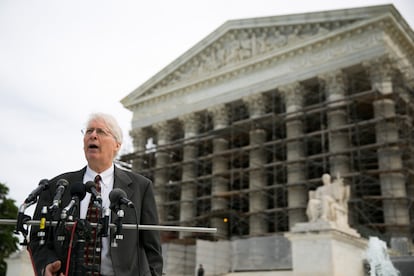‘Republicans aren’t going to stop: they’ll try to criminalize abortion throughout the US’
Historian Mary Ziegler shows how a change in campaign financing law enabled anti-abortion groups to elect extremists like Trump and control the Supreme Court


Legal historian Mary Ziegler (Butler, Montana, 1982) is one of the most well-known voices in the US abortion debate. She is the author of four books on the legal, political, and social consequences of the Supreme Court’s Roe v. Wade decision in 1973 ruling that the Constitution of the United States generally protects the liberty to choose to have an abortion. Ziegler published her fifth book on the issue, Dollars for Life (Yale University Press), just a few days before the Supreme Court overturned Roe v. Wade on June 24. Her new book offers an original perspective on perhaps the most polarizing issue in American society today with its analysis of the connections between campaign finance and challenges to women’s reproductive rights.
In her new book, the University of California, Davis professor dives deep into archives, accounting ledgers, and legal documents to examine a different Supreme Court ruling that had nothing to do with Roe v. Wade or even Planned Parenthood v. Casey, the anti-abortion movement’s first serious attempt in 1992 to overturn a woman’s right to choose (five of the nine Supreme Court justices, including three conservatives, voted to uphold that right in this case). Ziegler analyzes the Citizens United v. Federal Election Commission ruling, a controversial decision in 2010 that lifted limits on spending by corporations and other outside groups to support political candidates. This is known as outside money.

The author argues that the Citizens United ruling allowed the anti-abortion movement to hijack the Republican Party by flooding it with money. “They destroyed its traditional hierarchy,” writes Ziegler. That’s how they paved the way for the rise of unscrupulous populist leaders like Donald Trump who were committed to putting “justices on the Supreme Court who are willing to criminalize abortion.”
Trump more than delivered on his promise, even though at first, “anti-abortion leaders distrusted him and backed other candidates, because he had been pro-choice in the past,” Ziegler said in a phone interview. “[Trump] changed his mind on the fly, showing again that he was a calculating opportunist.” One passage in Dollars for Life argues, “The American anti-abortion movement contributed far more to the rise of Donald Trump and the transformation of the Republican Party than we tend to think… Scholars have tracked how booming Christian nationalism was key to Trump’s defeat of Hillary Clinton in 2016. But the influence of the anti-abortion movement was far greater, and it had everything to do with how money influences American politics.”
In just four years in the White House, and with the zeal of a recent convert, Trump succeeded in appointing three of the nine judges that currently sit on the Supreme Court. There are now six conservative justices and three liberals, an imbalance that will influence American society for decades to come (justices are appointed for life, and the newcomers are still in their fifties). Despite denying such intentions in their confirmation hearings, the three Trump nominees joined the court with the express purpose of overturning 50 years of Roe v. Wade.
“After the unfavorable Casey decision, the anti-abortion movement focused patiently on deregulating campaign financing. Before these rules changed,” Ziegler writes, “the Republican establishment forced extremist candidates out of the race by using its money to support candidates it could control.” Candidates like Pat Buchanan, who spouted aggressive, and some say prophetic, rhetoric, ran for the Republican presidential nomination in 1992 and 1996. Dismissed as a buffoon and viewed as a threat by his own party, Buchanan lost in primaries to two pedigreed Republicans – George W. Bush and Bob Dole. “Without the Citizens United decision, someone like Trump would never have succeeded in American politics. They lifted Trump to power,” concludes Ziegler.
Dollars for Life tells a story of a mutually beneficial alliance in which the anti-abortionists gained more than the Republican Party, which was not always “the pro-life party” it is now. Richard Nixon never lost much sleep over this issue. And several of the most famous Republican state governors of the Roe era pushed through permissive legislation in the late 1960s and early 1970s. Among these moderate Republicans were future vice presidents Spiro Agnew (Maryland) and Nelson Rockefeller (New York), as well as President Ronald Reagan, who would later regret signing that law as governor of California. When Reagan ran for president, he advocated banning abortion except in exceptional cases.
“Republicans welcomed voters from the anti-abortion ranks, but it wasn’t a priority issue for them. What’s more, for a while they thought it might alienate undecided voters, and they didn’t bother trying to change the composition of the Supreme Court to bring in more anti-abortion justices,” writes Ziegler.
But all that is history. The effects of the most recent Supreme Court decisions on the mid-term elections in November are still unclear. Besides its ruling on reproductive rights, the Supreme Court handed down decisions on the use of guns in public spaces, the separation of church and state, and the fight against climate change. The Democrats are confident they can mobilize voters to the polls and sway the undecided to their ranks, while the Republicans seem to have shed all pretenses. “It’s a little hard to tell today which is the real Republican Party,” said Ziegler. “Whatever it is, the party is clearly not going to stop at Roe v. Wade – they want to criminalize abortion throughout the country. Striking down Roe v. Wade is the beginning, not the end.”

The book’s main character is the fascinating James Bopp Jr., “one of the most prominent lawyers in the anti-abortion movement” and one of those behind-the-scenes guys that pull the strings of American democracy. He was a 24-year-old deputy attorney general of Indiana when the Supreme Court ruled on Roe v. Wade, and he has doggedly worked for its repeal ever since. Bopp was the one who made the connection between the change in campaign finance laws and the composition of the Supreme Court.
Bopp also recognized that Trump, then an unpopular and unlikely candidate ignored by the Republican establishment, could be the perfect vehicle for achieving the goals he had pursued for decades. “For the past 49 years, he [Bopp] has followed a master plan. I think that abortion has always been more important to him than politics or control of the party. He is a consummate strategist, someone who really enjoys the game of politics and all the maneuvering needed to win.”
He also doesn’t like to lose. When Joe Biden beat Trump in the November 2020 election by raising “more outside money in that campaign” than his opponent, according to Ziegler, Bopp was among the first and most fervent proponents of the baseless theory that Democrats committed massive election fraud to win. He even filed four lawsuits in key states that he eventually dropped without ever explaining why.
Tu suscripción se está usando en otro dispositivo
¿Quieres añadir otro usuario a tu suscripción?
Si continúas leyendo en este dispositivo, no se podrá leer en el otro.
FlechaTu suscripción se está usando en otro dispositivo y solo puedes acceder a EL PAÍS desde un dispositivo a la vez.
Si quieres compartir tu cuenta, cambia tu suscripción a la modalidad Premium, así podrás añadir otro usuario. Cada uno accederá con su propia cuenta de email, lo que os permitirá personalizar vuestra experiencia en EL PAÍS.
¿Tienes una suscripción de empresa? Accede aquí para contratar más cuentas.
En el caso de no saber quién está usando tu cuenta, te recomendamos cambiar tu contraseña aquí.
Si decides continuar compartiendo tu cuenta, este mensaje se mostrará en tu dispositivo y en el de la otra persona que está usando tu cuenta de forma indefinida, afectando a tu experiencia de lectura. Puedes consultar aquí los términos y condiciones de la suscripción digital.








































